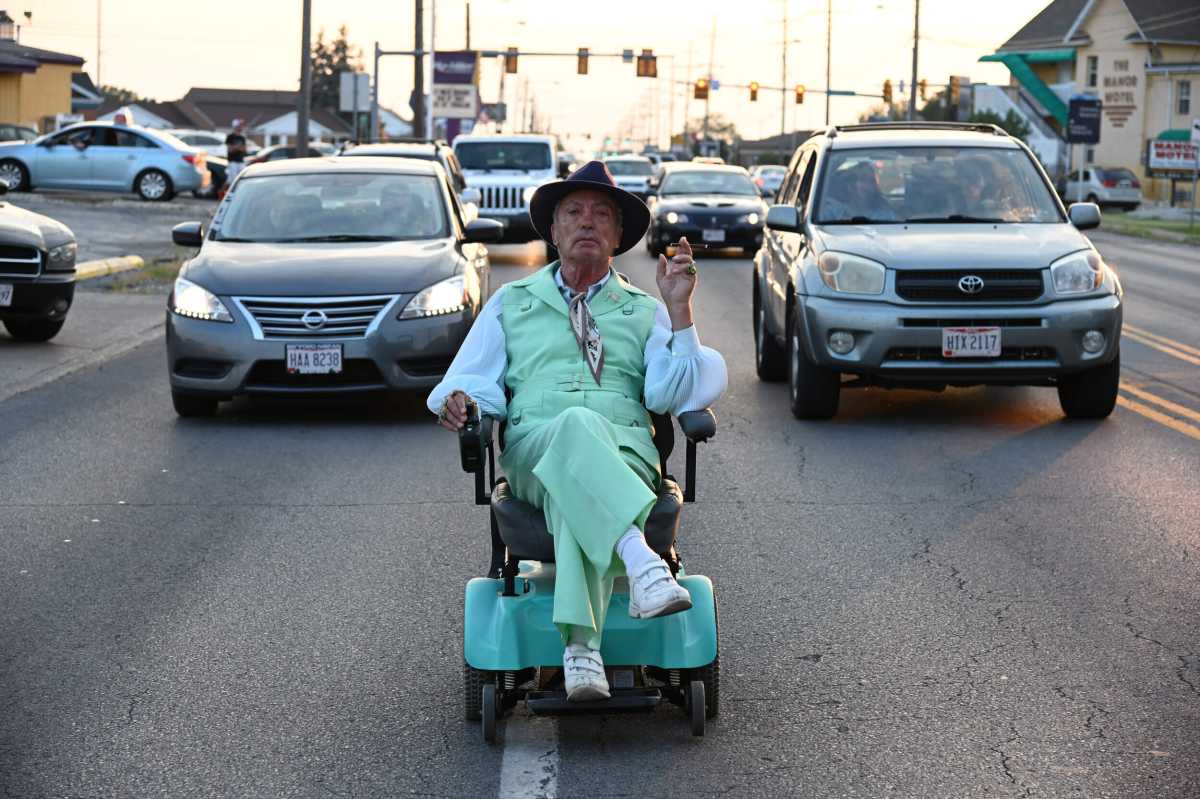A friend of mine posted a list of “gentle cinema” on Letterboxd, with his description explaining that the phrase meant “pleasant people doing pleasant things and there’s not much drama and you just kind of feel lovely about the world.” Todd Stephens’ “Swan Song” might be too haunted by mortality to fully qualify, but it’s remarkably kind and sweet. It nods to gay men from a generation before the director. Its hero, Pat (Udo Kier), and a friend sit on a park bench watching a gay couple play with their son and comment that the men who came after them owe them a debt. The casting of Kier matches the character, as he’s an openly gay actor whose career began in the early 1966. He worked repeatedly with gay filmmakers Rainer Werner Fassbinder and Gus van Sant, and two of his most memorable roles came in the Andy Warhol productions “Flesh for Frankenstein” and “Blood for Dracula.”
“Swan Song” suggests bleed between real life, dreams and memories. Its opening scene, in which Pat performs onstage, turns out to be a fantasy that fades into the far less glamorous grind of his life in a nursing home once he wakes up. He puffs away on cigarettes constantly there, while needing to hide his habit from the nurses. It reflects resistance to their dictates and a way to claim his own state, but it also implies that, as one nurse says, “sometimes, I think you want to have another stroke.” A retired hairdresser, he is asked to do the hair for a former friend who’s just passed so that she can still look beautiful in her coffin. This gives him a much-needed kick in the pants. He escapes the nursing home and wanders through Sandusky, hanging out with an old friend, going back to the bar that used to be his second home, and seeing visions of his late lover David.

Sandusky, Ohio is a fantasy rather than a real place. To quote the theme song from “Cheers,” it’s a small town where everyone knows your name. Stephens’ vision is very selective. In real life, the presence of chains and big-box stores in such towns is impossible to ignore. Stephens nonetheless does so. Pat goes from independent deli to food truck to hair salon to gay bar without a corporate logo in sight.
“Swan Song” passes up the usual areas of conflict in films about gay men. After Pat leaves the nursing home, he talks with a deli clerk coded as “redneck”: fat, covered with tattoos, wearing a scruffy beard, dressed sloppily. But the homophobia one might expect from such a man never comes. When David recalls coming out at 15, his experience was positive. The film does not deny that a man in his 70s is headed towards the end of his life, but its path there is laid out very cautiously and respectfully. While David died of AIDS, he appears in Pat’s visions as a handsome young man. Instead of portraying small towns as narrow-minded hellholes, “Swan Song” shows Sandusky as a haven for eccentrics.
Stephens’ low budget led to some amateurish performances in small parts. The film’s cinematography is drab. While this seems appropriate for the nursing home, it’s less clear that it’s deliberate for the entire movie. (The opening credits, in which flashing lights pulse rhythmically and “based on a true icon” are the first words, set us up for a film devoted to being excessively fabulous.)
Without Kier, this film might not work. He brings a real dignity to a character described as “the Liberace of Sandusky.” Part of his escape from the depressing environment of the nursing home requires a restoration of his wardrobe. He wears a fedora, loudly colored jackets, gaudy rings on almost every finger, and Cinderella shoes. But Kier never exaggerates Pat’s mannerisms so that he turns into a stereotype of camp flamboyance. Even when the film flirts with absurdism, Kier’s speech and body language always suggests that Pat thinks he can find a place in the world and achieve happiness. In one of his last major roles, Kier convincingly played a fascistic German-American who has arrived in Brazil to facilitate the locals’ slaughter in “Bacurau.” “Swan Song” shows the full range of his talent, giving us the flipside and avoiding received notions about elderly men.
SWAN SONG | Directed by Todd Stephens | Magnolia Pictures | Opened Aug. 6th at IFC Center

















